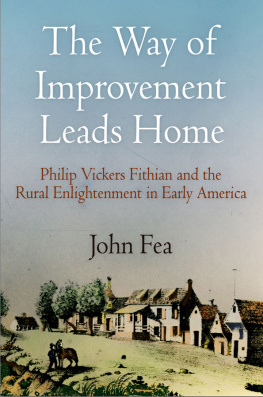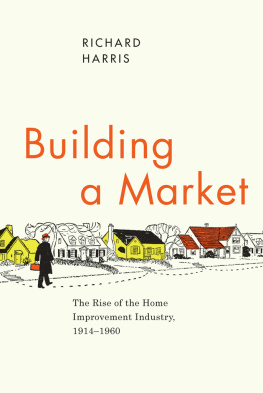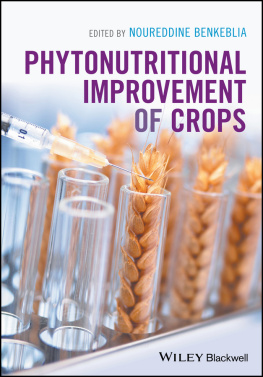The Way of Improvement Leads HomeEARLY AMERICAN STUDIES
Daniel K. Richter and Kathleen M. Brown, Series Editors
Exploring neglected aspects of our colonial, revolutionary, and early national history and culture, Early American Studies reinterprets familiar themes and events in fresh ways. Interdisciplinary in character, and with a special emphasis on the period from about 1600 to 1850, the series is published in partnership with the McNeil Center for Early American Studies.
A complete list of books in the series is available from the publisher.
Copyright 2008 University of Pennsylvania Press
All rights reserved. Except for brief quotations used for purposes of review or scholarly citation, none of this book may be reproduced in any form by any means without written permission from the publisher.
Published by
University of Pennsylvania Press
Philadelphia, Pennsylvania 19104-4112
Printed in the United States of America on acid-free paper
10 8 7 6 5 4 3 2 1
A Cataloging-in-Publication record is available from the Library of Congress
ISBN-13: 978-0-8122-4109-9
ISBN-10: 0-8122-4109-6
Introduction
On the morning of Friday, July 16, 1773, Philip Vickers Fithian awoke early and traveled from his Greenwich, New Jersey, house across the Cohansey River to Fairfield. There he spent several days with William Hollingshead, who would soon be installed as minister of the Fairfield Presbyterian church. Together they dined, drank tea, and exchanged the Usual Civilities with other friends and relations. The two passed their time together conversing on topics including the State of Affairs in Philadelphia, Philips candidacy for Presbyterian ordination, Hollingsheads upcoming sermon States of Man, and the useful & well-chosen Books in the ministers personal library. Philip and Hollingshead ate breakfast on Monday with Jonathan Elmer, their representative in the New Jersey Assembly. Later that day this gregarious duo traveled back to Greenwich, where Philip observed a long Confabulation between Hollingshead and Andrew Hunter, minister of the Greenwich Presbyterian church, on the subject of whether there is Scripture Authority for Diocesan Bishops (which was decided in the negative). Here they also encountered Richard Howell, one of Philips former classmates at the local Presbyterian academy, who shared with them news of his legal studies in New Castle, Delaware. Philip lamented that although Howell was a young Gentleman of considerable Genius, & has made good Proficiency in his Studies he is remarkably profane in his Principles, & loose in his Behaviour! After calling on several more friends, Philip returned home late Monday afternoon, Drank Tea with several Neighbors, and Went to bed about ten.
By examining Philips journal over this four-day period, one can learn much about what the young Presbyterian deemed important. His entries reveal the musings of an educated candidate for the Presbyterian ministry. The encounter with Richard Howell demonstrates his concern with personal morality and proper behavior. His breakfast with Elmer suggests an interest in political matters. Reflections on books and philosophy and discussions of current news from Philadelphia invoke a cosmopolitan spirit in the rural confines of Cohanseya series of small townships in southern New Jersey situated approximately forty-five miles southwest of Philadelphia.
Philips activities illustrate his attempt to rise above the parochialism and rusticity of the Jersey countryside to be a citizen of the world. By the middle of the eighteenth century the inhabitants of the British North American colonies had become exposed at an ever-increasing rate to the new learning emanating from such cultural and intellectual centers as London, Edinburgh, and Glasgow. Networks of communications and trade allowed such ideas to reach remote corners of the American provinces and connected even the most ordinary farming communities to the world of the British Enlightenment.
Although Philip sought to partake in a fellowship of learning and letters that oriented his mental and social worlds away from the place of his birth, the long mid-July weekend of 1773 could just as easily be interpreted through the lens of parochialism. Long-standing personal relationships, local communities of faith, and a sense of social obligation to the men and women who inhabited the soil where he was raised often provided the context for enlightened conversation. Jonathan Elmer was a close family friend. Andrew Hunter was the clergyman who had baptized Philip as an infant, catechized him as a boy, and encouraged him to pursue a career in the ministry. Richard Howell was a former schoolmate. In fact, all the people Philip spent time with that weekend were Presbyterians affiliated with the religious community that gave meaning to life in Cohansey.
Indeed, no one was more aware of the tensions between cosmopolitanism and local attachment than Philip. The need to reconcile the pursuit of Enlightenment ambition with a passion for home or a desire for God was perhaps the greatest moral problem facing the newly educated sons of British American farmers. Philip learned quickly that his pursuit of a life of learning, a vocation in the educated ministry, and a call to serve God and his new country would require a degree of detachment from friends, family, and the very soil of his homeland. Yet, Philips cosmopolitan turn is incomprehensible apart from these social connections. It was the people, the religious culture, and even the very landscape that continued to hold Philips affections and that shapedand transformedall that he learned beyond its bounds. As a child of the American Enlightenment, Philip could rely on intellectual, religious, and social scaffolding that enabled him to live a life worthy of a man of letters and yet benefit from the virtues of his local attachments. As a patriot, he could continue support for a highly cosmopolitan revolutionary ideology with the intense Presbyterian view of everyday life that permeated Cohansey culture. Ultimately he confronted the task of finding how best to adapt to the social and religious consequences of the modern quest for self-improvement. The result was a cosmopolitan rootedness that, in the context of Philips agrarian upbringing, I have called his rural Enlightenment.
The Way of Improvement Leads Home is a cultural and intellectual biography of Philip Vickers Fithian, one of early Americas most cited diarists. Historians who study colonial Virginia know Philip well. The journal he kept during the year (October 1773 to October 1774) he spent as a tutor on Robert Carters plantation in Virginias Northern Neck not only is a delight to read but also offers one of our most revealing glimpses into the life of the Chesapeake gentry at the time of the American Revolution. If the anecdotal evidence I have collected during the course of this project is any indication, Philips Virginia diary was a staple of undergraduate and graduate history seminars for two generations of students trained during the cold war.
Yet, despite Philips ubiquitous presence in interpretations of colonial Virginia, we still know little about him. With the exception of Vincent McCluskeys 1991 New York University doctoral dissertation, there has never been an attempt to write a biography of the man. His writings are most often used by historians as window dressing for their studies of the plantation Chesapeake. It seems that a quotation from Philip Vickers Fithian is the perfect way to enhance any historical narrative. The lack of detailed attention to Philips life is somewhat surprising in light of the fair amount of primary source material available to the biographer. Two older collections of Philips writings are still easily accessible to those interested in learning more about him. In 1900 John R. Williams published many of Philips personal letters and papers written during his years (177072) as a student at the College of New Jersey. While Philip did not live long enough to produce the kind of paper trail that the eras great statesmen have left us, such neglect of his story is unfortunate. His life sheds light on the history of colonial New Jersey and Virginia, the development of the early Presbyterian Church, eighteenth-century courtship rituals, and especially the impact of the Enlightenment on ordinary people at the time of the American Revolution.











